Religion in the European Union
Religion in the European Union is diverse. The largest religion in the EU is Christianity, which accounted for 72.8% of EU population as of 2018.[1] Smaller groups include those of Islam, Buddhism, Judaism, Hinduism, and some East Asian religions, most concentrated in Germany and France. Also present are revival movements of pre-Christianity European folk religions including Heathenism, Rodnovery, Romuva, and Druidry.[2]
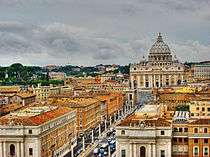
.jpg)
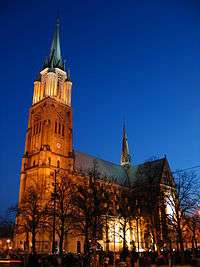
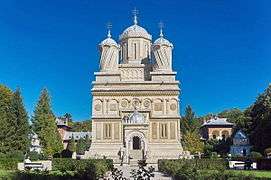

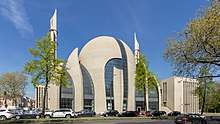
Over the last several decades, religious practice has been on the decline in a process of secularisation.[3] Eurostat's Eurobarometer survey in 2010 showed that 20% of EU citizens don't believe there is any sort of spirit, god, or life force.[4] Many countries have experienced falling church attendance and membership in recent years.[5]
The countries with the most people reporting no belief in any sort of spirit, god, or life force are France (40%), Czech Republic (37%), Sweden (34%), the Netherlands (30%), Estonia (29%), Germany (27%), Belgium (27%) and Slovenia (26%).[4] The most religious countries are Romania (1% non-believers) and Malta (2% non-believers).[4] Across the EU, belief is more common with older age and is higher amongst women, those with only basic education, and those "positioning themselves on the right of the political scale (57%)".[6]
Church and state
The EU is a secular body with a separation of church and state. There are no formal ties to any religion and no mention of any specific religion in any current or proposed treaty.[7] Discussion over the European Constitution's draft texts and later the Treaty of Lisbon have included proposals to mention Christianity and/or God in the preamble of the document. This call has been supported by Christian religious leaders, most notably the Pope.[8] However, the explicit inclusion of a link to religion faced opposition from secularists, and the final Constitution referred to Europe's "Religious and Humanist inheritance". A second attempt to include Christianity in the treaty was undertaken in 2007 with the drafting of the Treaty of Lisbon. Angela Merkel promised the Pope that she would use her influence during Germany's presidency to try to include a reference to Christianity and God in the treaty. This has provoked opposition, not least in the German press,[9] and as this inclusion may have caused problems in reaching a final agreement, this attempt was given up.[10] Of the Union's 27 states, only three have an official state religion, these being Denmark (Church of Denmark), Greece (Church of Greece), and Malta (Catholic Church). Some other churches have a close relationship with the state.[11] Until 2000, the Church of Sweden was the state church of Sweden.
In the secularising EU, The Vatican has been vocal against a perceived "militant atheism". It based this on a number of events, for example: the rejection of religious references in the Constitution and Treaty of Lisbon, the rejection by Parliament of Rocco Buttiglione as Justice Commissioner in 2004,[8] while at the same time Parliament approved Peter Mandelson (who is gay[12]) as Trade Commissioner, and the legalisation of same-sex marriage in countries such as the Netherlands, Belgium, and Spain.[8] The European Parliament has also been calling for same-sex marriages to be recognised across the EU.[13] Meanwhile, states such as Latvia and Poland[14] have rejected legislation designed to stop discrimination against homosexuals. This has been stated to be on religious grounds, with homosexual behaviour described as "unnatural", and the Catholic Church influencing public opinion. The difference of opinion between these countries and Brussels has been damaging relations.[15][16]
Due to the rise of other religions, and some intolerance towards them, the EU Commission now regularly meets with different religious leaders.[17] In November 2005, a delegation from the European Humanist Federation was invited to a meeting by Commissioner-President Barroso. This was the first time a humanist group had been consulted in this manner by the Commission. President Romano Prodi has refused such meetings, despite meeting various religious leaders, causing some resentment by humanists.[18]
Secularisation
Atheism and agnosticism have increased among the general population in Europe, with falling church attendance and membership in many countries.[19][20] The countries where the most people reported no religious belief were France (40%), Czech Republic (37%), Sweden (34%), the Netherlands (30%), Estonia (29%), Germany (27%), Belgium (27%) and Slovenia (26%).[4] The most religious societies are those in Romania with 1% non-believers and Malta with 2% non-believers. Across the EU, belief was higher among: the elderly, those with strict upbringings, those with the lowest levels of formal education, those leaning towards right-wing politics, and those more concerned with moral and ethical issues in science and technology over risk-benefit analysis.[6]
In 2012, the highest ever number of births outside of marriage were recorded in the European Union, at 40%,[21] with first-births out of wedlock and cohabitation figures being even higher. Seven EU countries recorded a majority of births outside of marriage - Estonia (59% in 2014[22]), Bulgaria (58.8% in 2014[23]), Slovenia (58.3% in 2014[24]), France (57.4% in 2014[25]), Sweden (54.4% in 2013[26]), Belgium (52.3% in 2012[26]), and Denmark (51.5% in 2013[26]). These countries tend to be some of the less religious ones.[27]
Religiosity
Most EU countries have experienced a decline in church attendance, as well as a decline in the number of people professing belief. The 2010 Eurobarometer survey found that, on average, 51% of the citizens of the EU Member States state that they believe there is a God, 26% state that they believe there is some sort of spirit or life force and 20% state that they don't believe there is any sort of spirit, God or life force. 3% declined to answer.[4] According to a recent study (Dogan, Mattei, Religious Beliefs in Europe: Factors of Accelerated Decline), 47% of French people declared themselves as agnostics in 2003. The situation of religion varies between countries in European Union. A decrease in religiousness and church attendance in Western Europe (especially in the Netherlands, Belgium, the United Kingdom, France, Germany, Finland, Norway, Sweden, Denmark, Spain, Portugal, Austria, Luxembourg and Czech Republic) has been noted and called "Post-Christian Europe". Also, in the most populous Eastern European country and EU Member State Poland there has been a sharp reduction in church attendance since 2005, although with 41.5% in 2009[28] it is still well above the single digit figures that are so typical for Sunday service attendance in other EU countries.
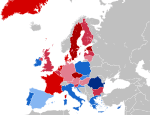
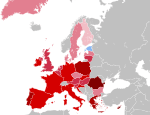
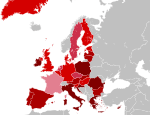
The following is a list of European countries ranked by religiosity, based on the rate of belief, according to the 2010 Eurobarometer survey. The 2010 Eurobarometer survey asked whether the person "believes there is a God", "believes there is some sort of spirit or life force" or "doesn't believe there is any sort of spirit, God or life force".
| Country | "I believe there is a God" |
"I believe there is some sort of spirit or life force" |
"I don't believe there is any sort of spirit, God or life force" |
"Declined to answer" |
|---|---|---|---|---|
| 94% | 4% | 2% | 0% | |
| 92% | 7% | 1% | 0% | |
| 88% | 8% | 3% | 1% | |
| 79% | 16% | 4% | 1% | |
| 79% | 14% | 5% | 2% | |
| 74% | 20% | 6% | 0% | |
| 70% | 20% | 7% | 3% | |
| 70% | 15% | 12% | 3% | |
| 69% | 22% | 7% | 2% | |
| 63% | 23% | 13% | 1% | |
| 59% | 20% | 19% | 2% | |
| 47% | 37% | 12% | 4% | |
| 46% | 22% | 24% | 8% | |
| 45% | 34% | 20% | 1% | |
| 44% | 38% | 12% | 6% | |
| 44% | 25% | 27% | 4% | |
| 38% | 48% | 11% | 3% | |
| 37% | 33% | 25% | 5% | |
| 37% | 31% | 27% | 5% | |
| 36% | 43% | 15% | 6% | |
| 33% | 42% | 22% | 3% | |
| 32% | 36% | 26% | 6% | |
| 28% | 47% | 24% | 1% | |
| 28% | 39% | 30% | 3% | |
| 27% | 27% | 40% | 6% | |
| 18% | 50% | 29% | 3% | |
| 18% | 45% | 34% | 3% | |
| 16% | 44% | 37% | 3% | |
| 51% | 26% | 20% | 3% |
Religious affiliation
religious_group_by_EU_member_state_-_Eurobarometer_2019.svg.png)
| Region | Catholic | Orthodox | Protestant | Other Christian | Total Christians | Non-Believer / Agnostic | Atheist | Muslim |
|---|---|---|---|---|---|---|---|---|
| 66.5% | 2.2% | 7.2% | 1.9% | 77.8% | 15.4% | 4.1% | 1.5% | |
| 52.9% | 1.6% | 2.1% | 4.1% | 60.7% | 17.1% | 14.9% | 5.2% | |
| 1.6% | 83.3% | 0.1% | 0.8% | 85.8% | 3.3% | 2.3% | 7.7% | |
| 1.3% | 96.3% | 0.0% | 0.8% | 98.4% | 1.1% | 0.5% | 0.0% | |
| 84.2% | 2.3% | 0.2% | 0.0% | 86.7% | 6.6% | 3.6% | 1.3% | |
| 27.1% | 0.2% | 1.0% | 3.2% | 31.5% | 38.6% | 25.8% | 0.0% | |
| 1.2% | 2.2% | 60.0% | 8.8% | 72.2% | 12.5% | 13.2% | 0.8% | |
| 2.8% | 23.2% | 9.0% | 23.6% | 58.6% | 16.6% | 22.2% | 0.2% | |
| 0.1% | 2.0% | 69.7% | 7.4% | 79.2% | 12.7% | 6.5% | 0.5% | |
| 47.8% | 0.6% | 1.8% | 4.1% | 54.3% | 17.6% | 22.8% | 3.3% | |
| 37.1% | 0.6% | 36.5% | 7.2% | 81.4% | 6.7% | 7.4% | 2.8% | |
| 7.1% | 2.1% | 19.2% | 8.8% | 37.2% | 27.0% | 34.1% | 0.0% | |
| 31.1% | 0.9% | 33.1% | 7.5% | 72.6% | 10.7% | 12.8% | 2.2% | |
| 0.4% | 92.9% | 0.1% | 1.0% | 94.4% | 1.9% | 1.6% | 1.2% | |
| 60.3% | 1.1% | 5.1% | 8.1% | 74.6% | 18.5% | 2.7% | 0.3% | |
| 80.7% | 0.7% | 1.8% | 4.3% | 87.5% | 5.8% | 4.6% | 0.8% | |
| 77.8% | 4.9% | 0.6% | 1.3% | 84.6% | 8.1% | 4.3% | 0.1% | |
| 26.2% | 24.0% | 16.6% | 9.9% | 76.7% | 17.3% | 4.7% | 1.2% | |
| 87.7% | 3.6% | 0.5% | 0.9% | 92.7% | 4.2% | 2.6% | 0.0% | |
| 64.8% | 3.5% | 3.6% | 0.7% | 69.8% | 11.2% | 10.3% | 2.1% | |
| 95.0% | 0.3% | 0.2% | 0.4% | 95.9% | 1.1% | 3.0% | 0.0% | |
| 21.9% | 1.9% | 17.8% | 6.2% | 47.8% | 39.6% | 9.2% | 1.4% | |
| 90.7% | 0.2% | 1.0% | 0.4% | 92.3% | 2.2% | 3.6% | 0.2% | |
| 85.8% | 0.2% | 1.1% | 1.6% | 88.7% | 8.2% | 2.3% | 0.1% | |
| 5.3% | 89.9% | 3.4% | 1.0% | 99.6% | 0.2% | 0.1% | 0.1% | |
| 73.1% | 2.2% | 6.2% | 2.2% | 83.7% | 5.0% | 7.4% | 0.0% | |
| 66.6% | 0.9% | 1.5% | 0.2% | 69.2% | 6.6% | 16.5% | 2.7% | |
| 64.2% | 1.4% | 0.8% | 2.2% | 68.6% | 17.0% | 10.9% | 0.6% | |
| 1.6% | 0.9% | 36.5% | 8.6% | 47.6% | 31.0% | 19.0% | 1.2% | |
| 12.7% | 9.6% | 14.7% | 19.2% | 56.2% | 20.6% | 11.8% | 4.7% | |
| 33.3% | 1.3% | 14.7% | 42.4% | 91.7% | 7.6% | 2.4% | 0.7% | |
| 45.3% | 9.6% | 11.1% | 5.6% | 71.6% | 13.6% | 10.4% | 1.8% |
Diversity
Immigration has increasingly introduced faiths not originally of significant adherence into Europe, most notably Islam.
It was estimated that the Union's Muslim population in 2009 was 13 million people.[33] The country with the largest number of Muslims in western Europe is believed to be France with an estimated 6–7 million (though the French census does not ask religious questions) followed by Germany (4.5 million), the United Kingdom (2.7 million)[34] and Italy (1.5 million).[35] Aside from Turkey, the other possible future member to have a majority of Muslims are Albania and Bosnia, although other Balkan states like Montenegro and Macedonia also have sizeable Muslim populations. Kosovo is also a Muslim majority area. A series of clashes and incidents connected to the religion have occurred in recent years, including: the murder of Theo van Gogh, the 2004 Madrid train bombings, the Jyllands-Posten Muhammad cartoons controversy, and the 7 July 2005 London bombings.[36] In response to extremism, some figures, such as Justice Freedom & Security Commissioner Franco Frattini, have suggested creating a "European Islam" – a branch of the Islamic faith that is compatible with European values.[37]
Judaism has had a long history in Europe going back to the Roman Empire. Prior to the Holocaust, the area of the European Union had a Jewish population of 5,375,000 but they were largely exterminated in Nazi concentration camps. In 2002, the EU had a Jewish population of barely over a million, including about 519,000 in France and about 273,500 in the United Kingdom. This can be compared with about 5.8 million Jews living in Israel.[38] In view of the history of persecution of Jews in Europe, antisemitism remains a matter of attention within the EU.[39]
See also
- Religion in Europe
- Culture of the European Union
- Fundamental Rights Agency
- Holy See–European Union relations
- LGBT rights in the European Union
- Christianity in Europe
- Islam in Europe
- List of religious populations
- Major world religions
References
- "Eurobarometer 90.4 (December 2018): Attitudes of Europeans towards Biodiversity, Awareness and Perceptions of EU customs, and Perceptions of Antisemitism", Special Eurobarometer, European Union: European Commission, 2019, retrieved 9 August 2019 – via GESIS
- Strmiska, Michael F. (2005). Modern Paganism in World Cultures: Comparative Perspectives. Santa Barbara: ABC-CLIO.
- Lilla, Mark (31 March 2006). "Europe and the legend of secularization". The New York Times.
- "Special Eurobarometer, biotechnology, page 204" (PDF). 2010.
- Ford, Peter (22 February 2005). "What place for God in Europe". USA Today. Retrieved 24 July 2009.
- "Eurobarometer 225: Social values, Science & Technology" (PDF). Eurostat. 2005.
- "Consolidated Treaties on European Union and establishing the European Community". Eur-Lex. Retrieved 25 June 2007.
- "Vatican resists European secularism". BBC News. 11 February 2005. Retrieved 14 July 2007.
- "European press review: God and the EU Constitution". BBC News/Süddeutsche Zeitung. 12 September 2006. Retrieved 14 July 2007.
- Rettman, Andrew (12 September 2006). "Merkel gives up on God in EU treaty". EU Observer. Retrieved 21 July 2007.
- Ferrari, Silvio. "Silvio Ferrari on "Church and State in Europe"". Concordat Watch. Retrieved 23 August 2007.
- Shoffman, Marc (3 June 2006). "Ian McKellen ranked most influential gay man". Pink News. Retrieved 23 August 2007.
- Belien, Paul (22 January 2006). "European Parliament Backs Gay Marriage". The Brussels Journal. Retrieved 23 August 2007.
- "Poland urged to drop new law banning 'homosexual propaganda' in schools". European Parliament. 23 April 2007. Retrieved 14 November 2007.
- Easton, Adam (10 May 2006). "Fears of Poland's gay community". BBC News. Retrieved 23 August 2007.
- Sheeter, Laura (16 May 2006). "Latvia defies EU over gay rights". BBC News. Retrieved 23 August 2007.
- "José Manuel Barroso meets European religious leaders". Europa (web portal). 12 July 2005. Retrieved 23 August 2007.
- "European Humanists Meet EU President". International Humanist and Ethical Union. 13 March 2006. Retrieved 23 August 2007.
- Cline, Austin (28 February 2005). "Secularism in Europe". About.com. Retrieved 21 July 2007.
- Zuckerman, Phil (2005). "Atheism: Contemporary Rates and Patterns". Cambridge University Press. Archived from the original on 10 June 2007. Retrieved 21 July 2007.
- "Eurostat - Tables, Graphs and Maps Interface (TGM) table". Ec.europa.eu. 11 August 2016. Retrieved 10 January 2017.
- "Among the Baltic States the greatest birth rate growth in 2014 was registered in Latvia | Latvijas statistika". Csb.gov.lv. 24 July 2015. Retrieved 10 January 2017.
- "Population and Demographic Processes in 2014: (Final Data)" (PDF). Nsi.bg. Retrieved 10 January 2017.
- "Births, Slovenia, 2014". Stat.si. 29 June 2015. Retrieved 10 January 2017.
- "Naissances hors mariage - Naissance, fécondité - France - Les chiffres - Ined - Institut national d'études démographiques". Ined.fr. Retrieved 10 January 2017.
- Riché, Preface xviii, Pierre Riché reflects: "[H]e enjoyed an exceptional destiny, and by the length of his reign, by his conquests, legislation and legendary stature, he also profoundly marked the history of Western Europe."
- "Report Evolution on the Family in Europe 2009 - Euro - Ethnicity, Race & Gender". Scribd.
- "Dominicantes 2009" (in Polish). ISKK. 2010. Retrieved 30 May 2012.
- 5 non-EU countries were included in the survey: Croatia (EU member since 1 June 2013), Iceland, Norway, Switzerland and Turkey.
- "Discrimination in the European Union". Special Eurobarometer. 493. European Commission. 2019. Retrieved 2 June 2020.
- "Discrimination in the EU in 2015", Special Eurobarometer, 437, European Union: European Commission, 2015, retrieved 2 March 2019 – via GESIS
- "GESIS: ZACAT". zacat.gesis.org.
- Miller, Tracy, ed. (October 2009). Mapping the Global Muslim Population: A Report on the Size and Distribution of the World’s Muslim Population (PDF). Pew Research Center. pp. 31–32. Archived from the original (PDF) on 10 October 2009. Retrieved 11 November 2009.
- "Ian Birrell: We have nothing to fear from our Muslim citizens". 11 December 2012.
- "Muslims in Europe: Country guide". BBC News. 23 December 2005. Retrieved 26 August 2007.
- "Muslims in the European Union" (PDF). EU FRA. 2006. Archived from the original (PDF) on 5 June 2007. Retrieved 26 August 2007.
- Goldirova, Renata (6 July 2007). "Brussels questions EU capitals over approach to Islam". EU Observer. Retrieved 26 August 2007.
- Jewish population figures may be unreliable. These estimates are taken from: Sergio DellaPergola. "World Jewish Population (2002)". American Jewish Year Book. The Jewish Agency for Israel. Archived from the original on 22 December 2004. Retrieved 3 May 2007.
- EUMC (December 2006). "Anti-Semitism Summary overview of the situation in the European Union" (PDF). EUMC. Archived from the original (PDF) on 11 June 2007. Retrieved 4 May 2007.
.jpg)
religious_group_by_EU_member_state_(and_5_other_countries)_-_Eurobarometer_2010.svg.png)